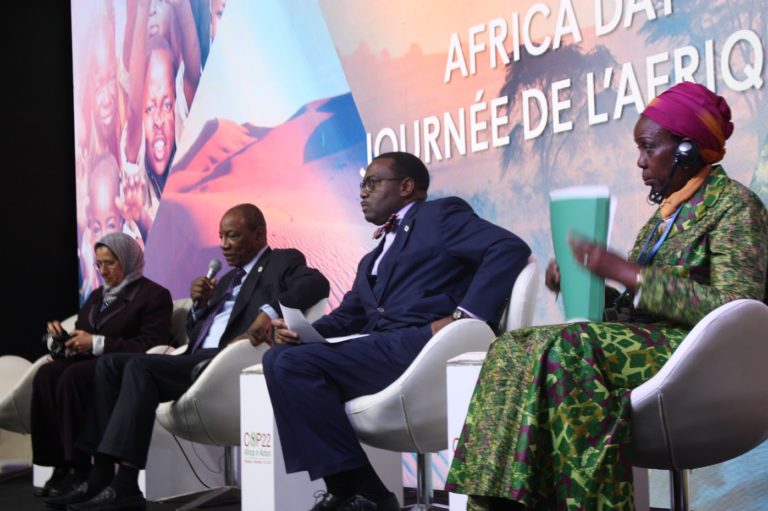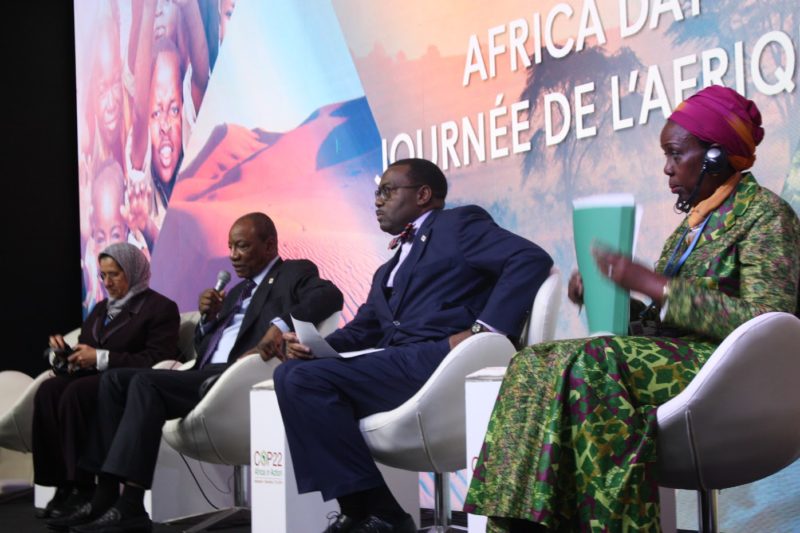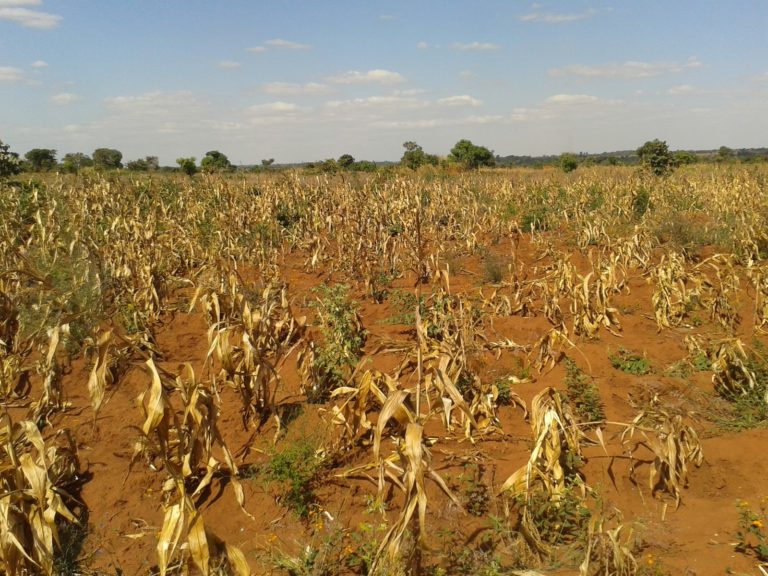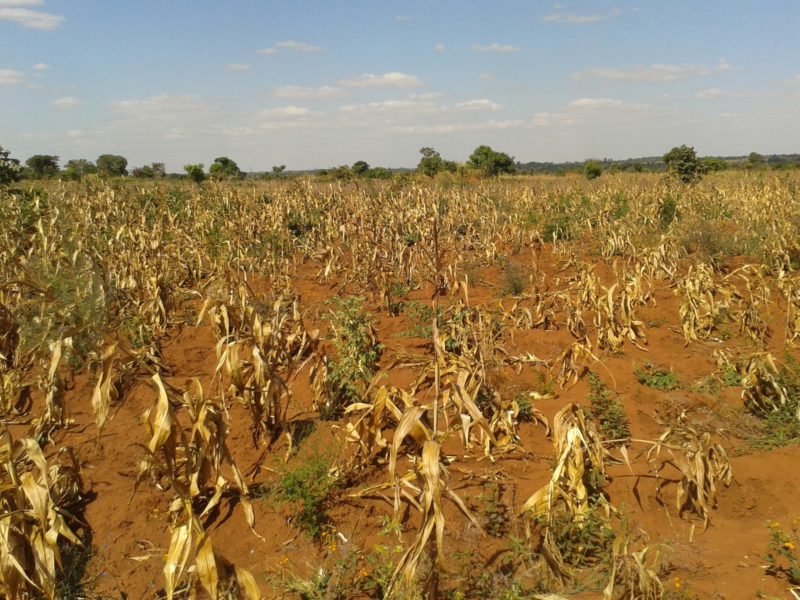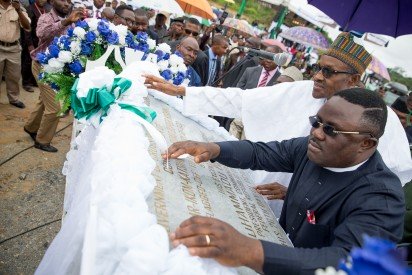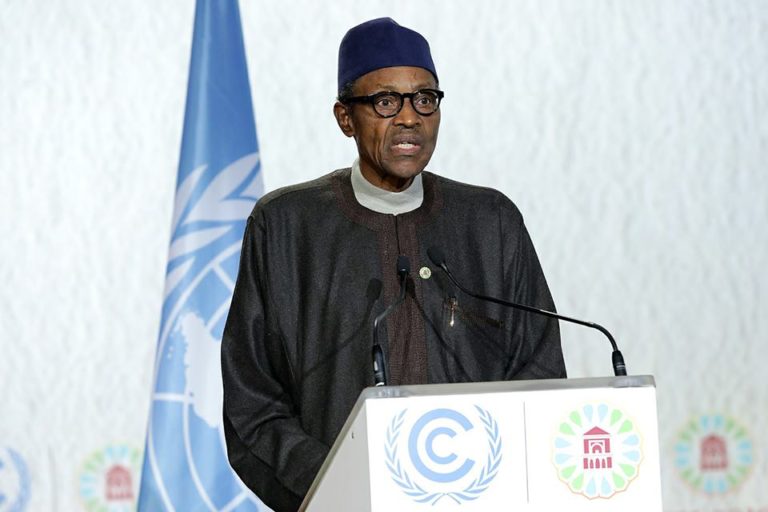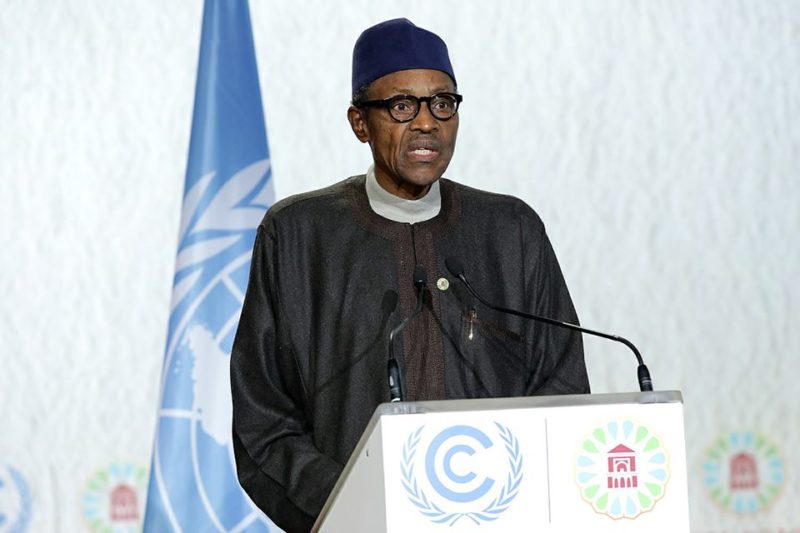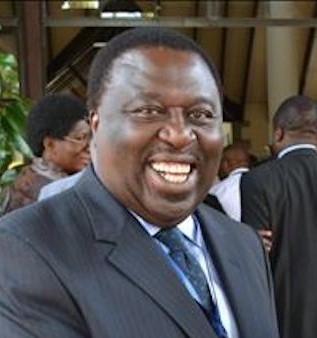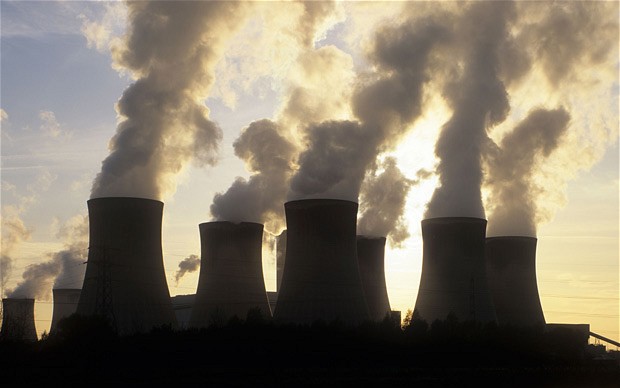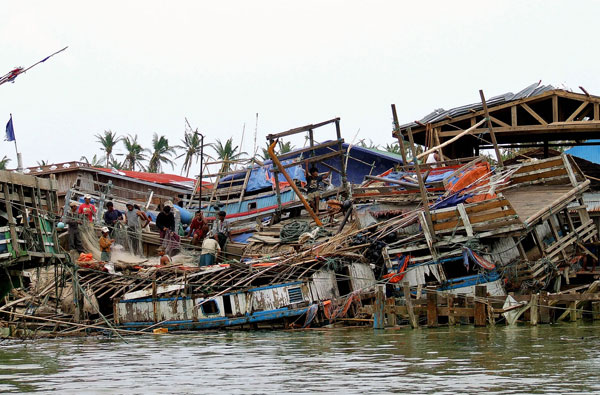Outgoing U.S. Secretary of State, John Kerry, at a media session on Wednesday in Marrakech, says that as the world hard work of implementing the Paris Agreement, the energy curve is bending towards sustainability because the market is clearly headed towards clean energy, and that that trend will only become more pronounced.
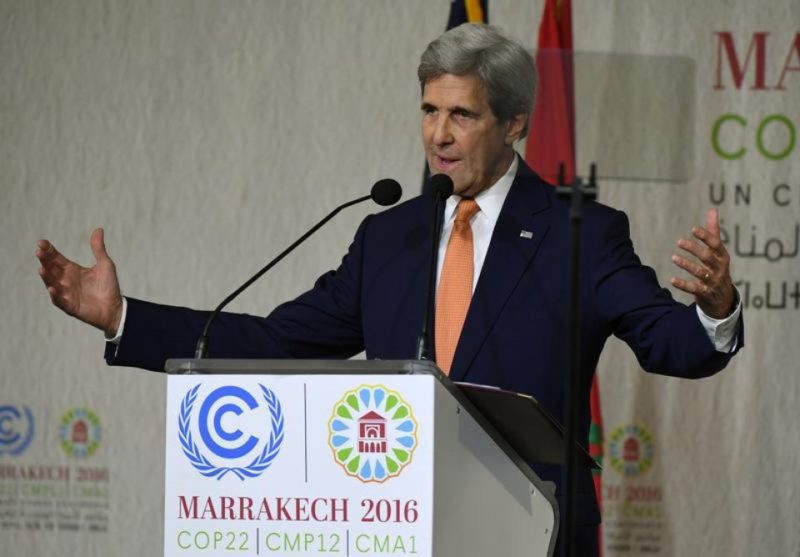
Thank you so much, everybody. I apologise for being a few moments late. There was a fire and then there was some traffic backed up, and so here I am and here are you, and thank you for being here.
Let me begin by thanking our terrific U.S. Special Envoy for Climate Change Jonathan Pershing. I couldn’t be luckier than to have him in this job. He was over at the Energy Department for a while. We stole him from Ernie Moniz, who is a great colleague and was gracious in my theft. And he has done a spectacular job working with all of our international partners as we begin the hard work of implementing the Paris Agreement. And I also want to thank Ambassador Jennifer Haverkamp, who, along with Jonathan and a lot of the team that I see sitting here, has done an absolutely terrific job in leading the State Department’s efforts to advance our climate goals this year. And I have to tell you – well, let me just divert for a minute. I also want to thank Brian Deese – I don’t know if he’s here – but I’m grateful for President Obama’s senior advisor on climate issues and the entire intrepid U.S. delegation to the COP, whom I had a chance to meet with earlier this morning, but we’ve kind of traveled this road together.
I also thank our international partners, and particularly the executive secretary of the UNFCCC, Patricia Espinosa; the outgoing president of the COP, Minister Segolene Royal of France; and the incoming COP president, my friend and our host this week, Minister Salaheddine Mezouar, the foreign minister of Morocco. And I also want to thank our partners from Fiji, who will serve as president for the next COP, which I intend hopefully to attend as Citizen Kerry.
It’s a great pleasure for me to be able to be here in Marrakech. I’m reminded of one of the 20th century’s most outsized figures whose connection with this city is so famous – Sir Winston Churchill. He loved to paint the landscapes here and to absorb the beauty and the culture.
And in fact, at the very height of World War II, as he and President Franklin Roosevelt and Allied leaders gathered in Casablanca to plan the strategy for the European Theater, Churchill was absolutely stunned to learn that Roosevelt had never been to this part of Morocco.
So in a move that perhaps only Winston Churchill would get away with in the middle of a global war – world war – Churchill convinced Roosevelt to extend his visit and drive through what was still, at the time, a country engulfed in active combat.
So after several hours on the loose, and because we’re talking about Winston Churchill, plenty of Scotch – (laughter) – the two leaders arrived in Marrakech in time to see the sun set on the Atlas Mountains.
And Churchill said it was the loveliest view on Earth.
So I think it’s fitting, therefore, that almost three-quarters of a century later, friends and allies meet again in Marrakech in order to undertake a very important discussion – a discussion about the natural world that surrounds us and the importance of preserving it for generations to come.
As Jonathan mentioned, climate change is deeply personal to me, but it’s personal to everyone in this room. I know that. And we obviously want it to be just as personal for everyone in every room: men, women, children, businesspeople, consumers, parents, teachers, students, grandparents. Wherever we live, whatever our calling, whatever our background must be, this is an imperative.
Now, I know the danger of preaching to the choir – and, obviously, all of us here are the proverbial choir. But I’m actually grateful for that, because here at the 22nd COP, no one can deny the remarkable progress that we have made – progress that actually was pretty hard to imagine even a few years ago. The global community is more united than ever not just in accepting the challenge, but in confronting it with real action, in making a difference. And no one should doubt the overwhelming majority of the citizens of the United States who know climate change is happening and who are determined to keep our commitments that were made in Paris. (Applause.)
None of us will forget the moment last December at Le Bourget, when the former foreign minister of France, with Segolene and a bunch of you there, led by our friend Laurent Fabius, who gaveled in the strongest, most ambitious global climate agreement ever negotiated. It was an accord that took literally decades to achieve – the proud work product of principled diplomacy, and ultimately, a deeply held, shared understanding that we’re all in this together.
And when we left Paris, no one rested on their laurels. Instead, the world – unified – moved expeditiously to begin the – to pull the agreement permanently into force, crossing the thresholds of 55 countries representing 55 percent of global emissions, and doing so far faster than even the most optimistic among us might have predicted. In a powerful statement of the whole world’s broad commitment to this agreement, in less than a year, 109 countries representing nearly 75 percent of the world’s emissions have now formally committed to bold, decisive action – and we are determined to affirm that action and to stick with it out of Marrakech.
Now, we have in place – (applause) – so we have in place a foundation, based on national climate goals – 109 nations, each of them have come up with their own plan, each of us setting goals that are based on our own abilities and our own circumstances. This agreement is, in fact, the essence of common but differentiated responsibilities. It provides support to countries that need help meeting the targets. It leaves no country to weather the storm of climate change alone. It marshals an array of tools in order to help developing nations to invest in infrastructure, technology, and the science to get the job done. It supports the most vulnerable countries, so they can better adapt to the climate impacts that many of those countries are already confronting.
And finally, it enables us to ratchet up ambition over time as technology develops and as the price of clean energy comes down. This is critical: the agreement calls on the parties to revisit their national pledges every five years, in order to ensure that we keep pace with the technology and that we accelerate the global transition to a clean energy economy.
This process – a cornerstone of our agreement – gives us a framework that is built to last, and a degree of global accountability that has never before existed. But I want to share with you that the progress that we’ve made this year goes well beyond Paris.
In early October, the International Civil Aviation Organisation established a sector-wide agreement for carbon-neutral growth. Why is this so important? Because international aviation wasn’t covered by what we did in Paris, and if that aviation was a country, it would rank among the top dozen greenhouse gas emitters in the world.
A few weeks later, I was pleased to be in Kigali, Rwanda, when representatives from again nearly 200 countries came together to phase down the global use and production of hydrofluorocarbons – which has been expected to increase very rapidly with a danger that is multiple of times more damaging than carbon dioxide. The Kigali agreement could singlehandedly help us to avoid an entire half a degree centigrade of warming by the end of the century – while at the same time opening up new opportunities for growth in a range of industries.
All of these steps combine to move the needle in the direction that we need to. And in large part because global leaders have woken up to the enormity of this challenge, the world is now beginning to move forward together towards a clean energy future.
Over the past decade, the global renewable energy market has expanded more than six-fold. Last year, investment in renewable energy was at an all-time high – nearly $350 billion. But that only tells you part of the story. An average of – that 350 billion is the first time that we’ve been able to see that money outpacing what is being put into fossil fuels. An average of half a million new solar panels were installed every single day last year. And for the first time since the Pre-Industrial Era, despite the fact that you have global prices of oil and gas and coal that are lower than ever, still more of the world’s money was invested in renewable energy technologies than in new fossil fuel plants.
And like many of you, I’ve seen this transformation take hold in my own country. That’s why I’m confident about the future, regardless of what policy might be chosen, because of the marketplace. I’ve met with leaders and innovators in the energy industry all across our nation, and I am excited about the path that they are on. America’s wind generation has tripled since 2008 and that will continue, and solar generation has increased 30 times over. And the reason both of those will continue is that the marketplace will dictate that, not the government. I can tell you with confidence that the United States is right now, today, on our way to meeting all of the international targets that we’ve set, and because of the market decisions that are being made, I do not believe that that can or will be reversed. (Applause.)
Now, much of this is due to President Obama’s leadership, and our Congress also moving in a bipartisan fashion on things like tax credits for renewable energy. This leadership has helped to inspire targeted investment from the private sector. Today our emissions are being driven down because market-based forces are taking hold all over the world. And that’s what we said we would do in Paris. None of us pretended that in Paris, the agreement itself was going to achieve two degrees. What we knew is we were sending that critical message to the marketplace, and businesses have responded, as I just described. Most businesspeople have come to understand: investing in clean energy simply makes good economic sense. You can make money. You can do good and do well at the same time.
Now, significantly, the renewable energy boom isn’t limited to industrialised countries, and that’s important to note. In fact, emerging economies like China, India, and Brazil invested even more in renewable technologies last year than the developed world.
China alone invested more than 100 billion dollars. Ultimately, clean energy is expected to be a multitrillion dollar market – the largest market the world has ever known. And no nation will do well if it sits on the sidelines, handicapping its new businesses from reaping the benefits of the clean-tech explosion.
My friends, we are in the midst of a global renewable energy surge, and as a result, in many places, clean energy has already reached cost parity with fossil fuels. Millions around the world are currently employed by the renewable energy industry. And if we make the right choices, millions more people will be put to work.
So good things are happening. The energy curve is bending towards sustainability. The market is clearly headed towards clean energy, and that trend will only become more pronounced.
Now, for those of us who have been working on this challenge for decades, this really is a turning point. It is a cause for optimism, notwithstanding what you see in different countries with respect to politics and change. In no uncertain terms, the question now is not whether we will transition to energy economy – to a clean energy economy. That we’ve already begun to do. The question now is whether or not we are going to have the will to get this job done. That’s the question now – whether we will make the transition in time to be able to do what we have to do to prevent catastrophic damage.
Ladies and gentlemen, I’m not a Cassandra. You can tell from what I’ve said. But I’m a realist. ime is not on our side. The world is already changing at an increasingly alarming rate with increasingly alarming consequences. The last time that Morocco hosted the COP was in 2001, and the intervening 15 years have been among the 16 hottest years in recorded history. 2016 is going to be the warmest year of all. Every month so far has broken a record. And this year will contribute its record-breaking heat to the hottest decade in recorded history, which was, by the way, preceded by the second-hottest decade, which was preceded by the third hottest decade. At some point, even the strongest skeptic has to acknowledge that something disturbing is happening.
We have seen record-breaking droughts everywhere – from India to Brazil to the west coast of the United States. Storms that used to happen once every 500 years are becoming relatively normal. In recent years, an average of 22.5 million people have been displaced by extreme weather events annually. We never saw that in the 20th Century.
Communities in island states like Fiji have already been forced to take steps to relocate permanently, because the places they have called home for generations are now uninhabitable. And there are many, many more who know it’s only a matter of time before rising oceans begin to inundate their cities.
I know this is a lot for anyone to process – hard to process. That’s why I have found that whenever possible, the best way to try to understand and to see whether people are pushing the envelope of thinking on this or not is to see for oneself what is happening. That’s why this summer I went to Greenland to visit the incredible Jakobshavn glacier. Scientists pointed out to me the lines many meters above the water today that mark the glacier’s retreat which it has done more in the past 15 years than it did in the entire previous century. And while I was there, I boarded a Danish naval vessel and I traveled through the ice fjord. I saw the massive ice chunks that had just broken off from the glacier to melt inexorably into the sea. And because they come off Greenland, which is on rock, every bit of that ice contributes to the rise of the ocean.
Since the 1990s, the painful pace of that melting has nearly tripled. Every day, 86 million metric tons of ice makes its way down that fjord into the ocean. And the total flow that comes off that glacier in a single year is enough water to meet the needs of New York City for two decades.
But experts in Greenland and elsewhere have always warned me, and they warned me on this trip this summer, if you really want to understand what’s happening and what the threat is, go to Antarctica. Nowhere on the planet are the stakes as high as they are on the opposite end of the globe. For half a century, climate scientists have believed the West Antarctic Ice Sheet is a sword of Damocles hanging over our entire way of life. Should it break apart and melt into the sea, it alone could raise global sea levels by four to five meters. And the scientists down there described to me how the pressure of the ice and the weight of the ice pushes the entire continent down so that it’s grounded on the base of Earth’s crust and rock. But that allows warmer sea water to creep in under the glacier and speed up the process of the melting and destabilize the glacier.
Antarctica contains ice sheets that are, in some places, on the East Antarctic Ice Sheet three miles deep. And if all that ice were somehow able to melt away completely because we are irresponsible about climate change, in the coming centuries, sea level would rise somewhere over 100 to 200 feet.
That’s why I flew last week to McMurdo Station in Antarctica to meet with our scientists and to understand better what is taking place. I flew by helicopter over the West Antarctic Ice Sheet. I walked out onto the Ross Sea ice shelf. And I talked with the scientists who are on the front lines, not people involved in day to day politics, but people who are making scientific judgment and doing extensive research. And they were crystal clear: The more they learn, the more alarmed they become about the speed with which these changes are happening. A scientist from New Zealand named Gavin Dunbar described what they’re seeing there as the quote, “canary in the coal mine” and warned that some thresholds, if we cross them, cannot be reversed.
In other words, we can’t wait too long to translate the science that we have today into the policies that are necessary to address this challenge. These scientists urged me to remind my own government and governments around the world and everyone here that what we do right now – today – matters, because if we don’t go far enough and if we don’t go fast enough, the damage we inflict could take centuries to undo – if it can be undone at all.
I underscore today: We don’t get a second chance. The consequences of failure would in most cases be irreversible. And if we lose this moment for action, there’s no speech decades from now that will put these massive ice sheets back together. There’s no magic wand in any capital in the world that you can wave to refill all of the lakes and rivers that will dry up, or make farm – arid farm land fertile again. And we certainly won’t have the power to hold back rising tides as they encroach on our shores. So we have to get this right, and we have to get it right now.
The scientists in Antarctica told me that they are still trying to figure out how quickly this is all happening. But they know for certain that it’s happening, and it’s happening faster than we previously thought possible. The alarm bells ought to be going off everywhere. As an American glacial geologist told me down there, a fellow by the name of John Stone, he said, “The catastrophic period could already be underway.” That’s why wise public policy demands that we take precautionary measures now.
Still, despite the real-life changes that are being done and the threat of more to come, it’s important to remind ourselves that we are not on a pre-ordained path to disaster. This is not pre-ordained. It’s not written in the stars. This is about choices – choices that we still have. This is a test of willpower, not capacity. It’s within our power to put the planet back on a better track. But doing that requires holding ourselves accountable to the hard truth. It requires holding ourselves accountable to facts, not opinion; to science, not theories that haven’t been proven and can’t be proven; and certainly not to political bromides and slogans.
For all the progress that we are making, at the current pace we will not meet our goal. I said that earlier. We knew in Paris that what we were doing was trying to start down a road. But we also knew it doesn’t get us to the end of the journey. Yes, renewables make up more than half of all the new electricity installation last year. That’s progress. But the reality is because of the existing energy infrastructure already in place, that new energy only generated a little more than 10 percent of the world’s total energy. That is nowhere near what we need in order to achieve our goals.
If we’re going to have the ability to stave off the worst impacts of climate change, we have to dramatically accelerate the transition that is already starting. We need to get to a point where clean sources are generating most of the world’s energy, and we need to get there fast. Certainly experts tell us by the middle of this century we have to get there.
Now, I’ve said many times, and I’ll say it again today: It is not going to be governments alone, or even principally, that solve the climate challenge. The private sector is the most important player. And already we are seeing real solutions coming from entrepreneurs and academia. It’s going to be innovators, workers, and business leaders, many of whom have been hammering away at this challenge for years who are going to continue to create the technological advances that forever revolutionize the way that we power our world.
But make no mistake, government leadership is absolutely essential. And because today is the last opportunity I will have to address the COP as Secretary of State, I just want to take a moment to underscore the work that government leaders can do and should do, especially the 200 – almost 200 nations represented here.
Now, we know that we have not come to Marrakech to bask in the glow of Paris. We’ve come here to move forward. In doing so, we cannot forget that the contributions we’ve each made thus far were never meant to be the ceiling. They’re a foundation on which we expect to build. And unless our nations voluntarily ratchet up our ambition, and unless we continue to put sustained pressure on one another to act wisely, we will have difficulty meeting the current mitigation needs, let alone holding temperature increases at 2 degrees warming, which science tells us is a tipping point.
And if we fall short, it will be the single greatest instance in modern history of a generation in a time of crisis abdicating responsibility for the future. And it won’t just be a policy failure; because of the nature of this challenge, it will be a moral failure, a betrayal of devastating consequence.
Now, I know not – that’s not what any of us here signed up for. As Pope Francis said, “We receive this world as an inheritance from past generations, but also as a loan for future generations, to whom we will have to return it.”
Now, I fully recognize the challenges that a number of countries face because they have a big population, they have a growing economy, they have a lot of people in poverty, they’re determined to maintain stability and pull those people into the economy. And of course, they’re concerned about stability – we all are. Access to affordable energy is a key part of providing that stability. And the dirtiest sources of energy are, unfortunately, some of the cheapest. But I emphasise this: Only in the short term. In the long term, it’s an entirely different story, folks. In the long term, carbon-intensive energy is actually today, right now, one of the costliest and most foolhardy investments any nation can possibly make. And that is because the final invoice for carbon-based energy includes a lot more than just the price of the oil or the coal, or the natural gas; it – or the price of building the power plant. The real cost accounting needs to fully consider all of the downstream consequences, which, in the case of dirty fuels, are enough to at least double or triple the initial expenses.
That’s the kind of accounting that we need to do today. Just think about the price of environmental and agricultural degradation. Think about the loss of an ability of farmers in one area because of the lack of water or too much heat to be able to grow their crops today. Think of the hospital bills for asthma and emphysema patients, and the millions of deaths that are linked to air pollution caused by the use of fossil fuels.
In 2014, a study found that up to six million people in China have black lung because they lived and worked so close to coal-fired power plants. There are nearly 20 million new asthma cases a year in India linked to coal-related air pollution, and in the United States, asthma costs taxpayers more than $55 billion annually. The greatest cause of children being hospitalized in the summer in the United States is environmentally induced asthma. These are real costs, and they need to be added to the tally.
We also have to include the price tag of rebuilding after devastating storms and flooding. Just in the first three quarters of this year alone, extreme weather events have cost the United States – have cost American taxpayers $27 billion in damage. In August alone, Louisiana experienced flooding that resulted in roughly $10 billion worth of damage.
So none of us can afford to be oblivious to these expenses, and these initial costs are in reality just a glimpse of what the future could hold in store for us if we fail to respond. Just imagine: Sea barriers that have to be built. Go down to Miami – in south Miami, they’re building – they’re raising streets to deal with flooding that’s already occurring, building new storm drains and assessing people additional tax in order to do it. Massive increases in cost of maintaining infrastructure to control flooding, withstand storms. Power outages. All of this and more has to be added to any honest assessment of high-carbon energy sources. And in an age of increasing transparency and public demand for accountability, citizens in the long run will not accept phony accounting or an obfuscation of the consequences of the decisions.
So everyone needs to make smarter choices – with the long game, not the short game, in mind.
Coal, unfortunately, is the single biggest contributor to global carbon pollution. It provides about 30 percent of the world’s energy, but it produces nearly 50 percent of the world’s greenhouse gases. The unprecedented investments that we are now seeing in clean energy will mean very, very little if, at the same time, new coal fire plants without carbon capture are coming online and at a rate dumping into the atmosphere more and more of the very pollution that we’re all working so hard to reduce.
Some of these projections, I have to tell you, are deeply troubling. For example, between now and 2040, the demand for electricity in Southeast Asia is likely to triple – and the bulk of that demand is currently expected to be met by growth – where? In the coal-fired power sector, rather than clean energy. That threatens everything we’re trying to achieve here.
We literally cannot use one hand to pat ourselves on the back for what we’ve done to take steps to address climate change, and then turn around and use the other hand to write a big fat check enabling the widespread development of the dirtiest source of fuel in an outdated way. It just doesn’t make sense. That’s suicide. And that’s how we all lose this fight.
Make no mistake: People all over the world are working for victory in this. And this issue is increasingly capturing the attention of citizens everywhere, and certainly the private sector. The private sector welcomed the signals that we sent in Paris, but they are demanding even stronger signals now – the private sector – so that they can invest clean energy solutions with even greater confidence.
One of the strongest signals that government can send, one of the most powerful ways to reduce emissions at the lowest possible course – cost – is to move toward carbon pricing that puts basic, free-market economics to work in addressing this challenge.
Now obviously, this is not a new idea. Many have come to this conclusion already. The share of global emissions that are covered by a carbon price has tripled over the last decade. Last year, more than 1,000 businesses and investors – including sectors that might be surprising to some of you – all came together to voice their support for carbon pricing. The long list of supporters includes energy companies like BP, Royal Dutch Shell, utilities like PG&E, transportation companies like British Airways, construction firms like Cemex, financial institutions like Deutsche Bank, like Swiss Re, and consumer goods corporations like Unilever and Nokia. These companies all believe that carbon pricing will establish the necessary certainty in the marketplace that helps the private sector to move the capital that helps to solve the problem.
Carbon pricing allows citizens, innovators, and companies – it allows the market to make independent decisions free from the government to be able to best drive their emission reductions. And this is also, by the way, the chief reason that carbon pricing has received support from leaders and economists on both sides of the aisle in the United States of America. A price on carbon, coupled with government support for innovation in key sectors, is easily one of the most compelling tools for the world to accelerate the clean energy transformation that we are working to achieve. Now, while it may be some time before we see this ideal outcome, the effort to improve carbon markets ought to be a priority going forward.
The bottom line is that there are many tools at the world’s disposal. The COP itself is an important tool, in a sense. It has become much more of a – much more than just a gathering of government officials. It’s really a yearly summit, 25,000 people strong this year from all over the world, for all sectors to showcase their commitment to climate action and to discuss ways to expand shared efforts. It’s a regular reminder of exactly how much this movement has grown – and how many people, in how many countries, are committed to action.
Walking around the conference here before I was coming in here and seeing this site in Marrakech, and seeing the delegations and the business leaders, the entrepreneurs and the activists who have traveled from near and far to be here, it’s abundantly clear we have the ability to prevent the worst impacts of climate change.
But again, we’re forced to ask: Do we have the collective will? Because our success is not going to happen by accident. It won’t happen without sustained commitment, without cooperation and creative thinking. And it won’t happen without confident investors and innovative entrepreneurs. And it certainly won’t happen without leadership.
For those in power in all parts of the world, including my own, who may be confronted with decisions about which road to take at this critical juncture, I ask you, on behalf of billions of people around the world: Don’t take my word for it. Don’t take just the existence of this COP as the stamp of approval for it. I ask you to see for yourselves. Do your own due diligence before making irrevocable choices.
Examine closely what it is that has persuaded the Pope, presidents, and prime ministers all over the world, leaders around the world, to take on the responsibility of responding to this threat. Talk to the business leaders of Fortune 500 companies and smaller innovative companies, all of whom are eager to invest in the energy markets of the future. Get the best economists’ judgment on the risk of inaction, of what the cost would be to global economies, versus the opportunities that are to be found in the clean energy market of the future. Speak with the military leaders who view climate change as a global security concern, as a threat multiplier. Ask farmers about – and fisherman about the impact of dramatic changes in weather patterns on their current ability to make a living and to support their families or on what they see for the future. Listen to faith leaders talk about the moral responsibility that human beings have to act as stewards of the planet that we have to share, the only planet we have. Bring in the activists and civil society, groups who have worked for years with communities all over the world to raise awareness and to respond to this threat. Ask young people about their legitimate concerns for the planet that their children will inherit in reducing emissions worldwide.
And above all, consult with the scientists who have dedicated their entire lives to expanding our understanding of this challenge, and whose work will be in vain unless we sound the alarm loud enough for everyone to hear. No one has a right to make decisions that affect billions of people based on solely ideology or without proper input.
Anyone who has these conversations, who takes the time to learn from these experts, who gets the full picture of what we’re facing – I believe they can only come to one legitimate decision, and that is to act boldly on climate change and encourage others to do the same.
Now, I want to acknowledge that since this COP started, obviously, an election took place in my country. And I know it has left some here and elsewhere feeling uncertain about the future. I obviously understand that uncertainty. And while I can’t stand here and speculate about what policies our president-elect will pursue, I will tell you this: In the time that I have spent in public life, one of the things I have learned is that some issues look a little bit different when you’re actually in office compared to when you’re on the campaign trail.
And the truth is that climate change shouldn’t be a partisan issue in the first place. It isn’t a partisan issue for our military leaders at the Pentagon who call climate change a threat multiplier. (Applause.) It isn’t a partisan issue for those military leaders because of the way that climate change exacerbates conflicts all over the world and who view it as a threat to military readiness at their bases and could suffer the consequences of rising seas and stronger storms. It isn’t a partisan issue for our intelligence community, who just this year released a report detailing the implications of climate change for U.S. national security: threats to the stability of fragile nations, heightened social and political tensions, rising food prices, increased risks to human health, and more.
It isn’t a partisan issue for mayors from New Orleans to Miami, who are already working hard to manage sunny-day floods and stronger storm surges caused by climate change. It isn’t partisan for liberal and conservative business leaders alike who are investing unprecedented amounts of money into renewables, voluntarily committing to reduce their own emissions, and even holding their supply chains accountable to their overall carbon footprint.
And there’s nothing partisan about climate change for the world scientists who are near unanimous in their conclusion that climate change is real, it is happening, human beings for the most part are causing it, and we will have increasing catastrophic impacts on our way of life if we don’t take the dramatic steps necessary to reduce the carbon footprint of our civilization.
Now, whether we are able to meet this moment is a big test – probably as big a test of courage and vision as you’ll ever find. Every nation has a responsibility to do its part if we are going to pass that test – and only those nations who step up and respond to this threat can legitimately lay claim to a mantle of global leadership. That’s a fact.
More than his love of Marrakech, Winston Churchill was known for his hard-nosed insight and the way that he expressed it. He once argued, tellingly: “It’s not always enough that we do our best; sometimes we have to do what is required.”
We know today what is required. And with all of the real-world evidence, with all of the peer-reviewed science, with all of the plain just old common sense, there isn’t anyone who can credibly argue otherwise. So we have to continue this fight, my friends. We have to continue to defy expectations. We have to continue to accelerate the global transition to a clean energy economy. And we have to continue to hold one another accountable for the choices that our nations makes.
Earlier this year, on Earth Day, I had the great privilege of signing the Paris Agreement on behalf of President Obama and the United States. It was a special day. And because my daughter lives in New York, I invited her to join me at the UN. She surprised me by bringing my 2-year-old granddaughter, Isabelle, along as well.
And that morning, I had been thinking about the history that had brought us to that day. I thought about the first Earth Day in 1970 that I mentioned earlier, when I joined with millions of Americans in teach-ins to educate the public about the environmental challenges we faced. I thought about the first UN climate conference in Rio, which is actually where I met my wife Teresa, and I thought of the urgency that we all felt way back then in 1992. And of course, I thought about that December night at Le Bourget, when it seemed – for the first time – that the world had finally found the path forward.
But as I sat and I played with my granddaughter, waiting for my turn to go out and sign the Agreement, I thought, not of the past, but I thought of the future. Her future. The world her children would one day inherit.
And when it was time for me to go up on that stage, I scooped her up and I brought her out with me. I wanted to share that moment with her. And I’ll never forget it.
But to my surprise, people responded to her presence that day, and since then so many people have said to me, they’ve conveyed to me how that moment conveyed something special and moved them. They told me they thought of their own children, their own grandchildren. They thought of the future. They were reminded of the stakes.
Ladies and gentlemen, here in Marrakech, in the next hours, let us make clear to the world that we will always remember the stakes. Let us stand firm in support of the goals that we set in Paris and recommit ourselves to double our efforts to meet them. Let us say that when it comes to climate change, we will commit not just to doing our best, but as Winston Churchill admonished, we will do what is required.
I look forward to working with you in this important work for whatever number of years


